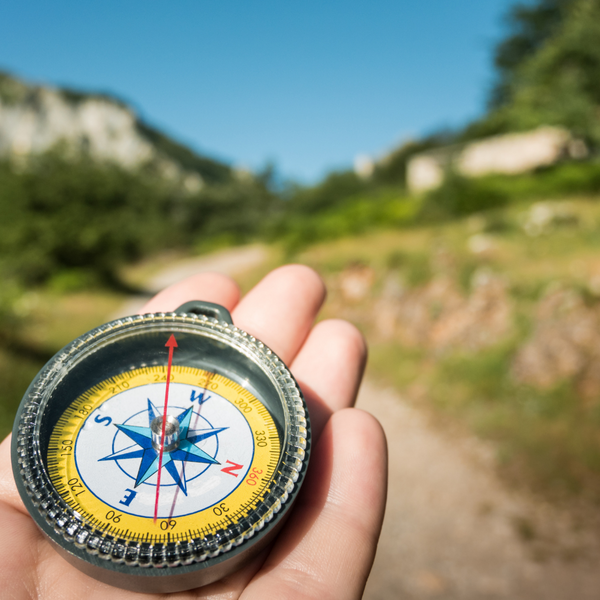Have you ever gotten lost on the trail? Do you know what to do if you get lost while hiking?
We asked you these questions in an Instagram stories poll, and here's what you said:
- 55% of you said yes, you have gotten lost hiking
- 45% of you said no, you would not know what to do if you got lost

Did you know getting lost hiking is one of the most common causes for search and rescue missions (SARs)?
In fact, one study of SARs in Yosemite National Park found that 62% of these missions were executed to find missing hikers.
A hiker can become lost for a number of reasons including:
- Lack of experience hiking in the wilderness
- Lack of navigation gear
- Lack of preparedness
If you’ve been hitting the trails for a while now, you may already have a story about that one time you got lost while hiking. Don’t worry - we’ve been there too.
Most of the time, these make for good campfire stories, but the truth is getting lost while hiking can be dangerous and expensive.

In this blog, we will share tips and tools for you to avoid getting lost on the trail. Plus, we’ll cover what to do in the event that you do get lost hiking.
Whether you’re new to hiking or you’ve been trekking for a while, this information will be valuable to you.
Pre-Hike Preparedness
Before you even set out on your hike, there are a few pointers we'd like to cover. Of course, nobody plans on getting lost, but everyone should prepare for it. Being prepared can make the difference between a story you tell around the campfire vs. a stressful experience.
Here's how you can reduce the risk of something bad happening in the event that you do get lost hiking:
- Carry the 10 Essentials + a portable charger: You should have these hiking essentials on every hike. Review the 10 Essentials now.
- Let someone know where you’re going: There are multiple hiking apps, like AllTrails, that allow you to share your plans with someone. We'll cover them in depth later in this blog.
- Have an emergency plan: Your emergency plan should include checking the weather, telling someone where you're going, carrying essential items for survival, and having a way to communicate if you end up lost.
- Plan your hike ahead of time. This includes reviewing the route, downloading/printing a map, and having a way to track yourself on the trail.
- Take a map and compass class! You can take classes at REI, with the Sierra Club, The Mountaineers.
Now that you have some basic tips, let's talk about how to avoid getting lost while you're on your hike.

Tips to Avoid Getting Lost While Hiking
- Stick to local or regional parks: If you're just getting started hiking, avoid vast wilderness and instead select areas that are easy to navigate.
- Choose well-defined trails: You can refer to AllTrails to see if a trail is rated as “easy” or “moderate.” Easy trails are usually well-marked and great for beginners.
- Opt for moderately trafficked trails: While nobody likes a crowded trail, you will be safer choosing a trail that is somewhat busy. That way, you can ask someone for directions if you get lost. AllTrails also shares this information.
- Hike an "out & back" trail: Instead of taking a loop where you won't see people returning, choose an out & back trail. With this type of trail, you will literally retrace your steps, and you can ask others if you're on the right track.
- Be aware of your surroundings: Look around every quarter mile and take note of landmarks or distinguishable features (like a big tree). Keep in mind the same trail will look different when you're returning.
- Wear a GPS fitness watch: Track your trek with a GPS fitness watch like the Garmin Fenix 5x. Some watches will even send out an emergency distress signal with your coordinates if it detects that you haven't moved in a while.
-
Get a GPS tracking device: Add a GPS device to your Ten Essentials and gain peace of mind on every hike. We recommend the ZOLEO Satellite Communication Device that has its own app.
Test your tracker tools before you go: Take a walk in your local neighborhood to make sure your GPS tools are working properly. Make sure you know how to use your devices before you set out.
- Download and carry a printed map: Since trails might not always be well-marked, it's a good idea to have a printed map and a way to track yourself on-trail. First, we recommend you always print a map of the chosen trail and put it in a ziplock bag. This way if your backback was to get wet or in case of rain, your map is still intact. As a backup, download the map on your phone. There are tons of free hiking apps that we'll share in the section below.

Track Your Trek with a Hiking App
The hiking community has grown a lot and now that hiking culture is becoming even more popular than ever before, there are a lot of hiking apps available to you. The good news is most of these apps are free or inexpensive.
We recommend you do your research to find the best hiking app for you. Here are some suggestions to get you started:
- Spyglass: This adventure app serves as a virtual compass and GPS navigator for hikers, bikers and explorers of all kinds.
- The Hiking Project: As an offline GPS app for hikers, Hiking Project makes it safer for you to explore new terrain.
- PeakFinder: If the mountains are calling, this is the app for you. PeakFinder makes hiking mountains more accessible with offline access to over 850,000 peaks around the world.
- Cairn: With hiking safety top-of-mind, this hiking app allows you to share your hiking plans, find cell coverage, download offline maps and much more.
- AllTrails Pro: Stay on course with the pro version of AllTrails. For a small fee, you can download offline maps and the app will even notify you when you've stepped off-route.
- Gaia GPS: Use this hiking app to find trails and plan your hikes. You can download GPS tracks for free and upgrade for offline downloading capabilities.
- Map My Walk: Whether you're taking a neighborhood walk or hiking in a nearby recreational park, this app will map and track your course.
Now that you know how to avoid getting lost hiking and which hiking apps are best for navigating the trails, let's explore what to do if you get lost.

What To Do If You Get Lost Hiking
You're out hiking, and you suddenly realize you're lost. Now what?
In our Instagram stories poll, 45% of you said you wouldn't know what to do if you got lost hiking. Luckily, we're going to cover that right now.
According to the U.S. Forest Service, there are four key steps to follow:
Step 1: Stop.
If you get lost, stop hiking and assess the situation. Remain calm, don't panic.
Step 2: Think.
How did you get lost? What's the last landmark you remember? Take time to stop and think before you take another step.
Step 3: Observe.
Before hiking any further, use your orientation tools (map, compass, GPS device, etc.) to find out where you are. Are you on a trail? Is there a river or stream nearby?
Step 4: Plan.
Based on your assessment, come up with a few possible plans. If you are on a trail, you can stay on it and track back. If you're not on a trail, you can follow a river to travel downhill as a very last resort. If you are not extremely confident in your route, it's best to stay put and wait for help. If you are injured, dehydrated or exhausted, stay where you are.
If you choose to pursue self-rescue, please proceed with caution. Take breaks as you need them and stay hydrated. Remember: you can use certain GPS devices to send out a distress signal.

Take a Navigation Class
One of the best things you can do for yourself is to take classes to help you with your outdoors skills and knowledge. There are many classes out there, a quick internet search of "map and compass" or "navigation course" is a good place to start. REI has this class available in various areas around the U.S. Their instructors will help you "understand the information provided on your map, the proper use of your compass, and how to put the two together. You'll get time to practice taking a bearing from the terrain and your map so that you can make sense of your position and plan a route. This course is a great introduction to outdoor navigation and map reading!"

Hiking Safety Recap
Follow these pointers to stay safe on the trails:
- Plan for the unexpected and have an emergency plan
- Always carry the 10 Essentials on every hike
- Use a hiking app to track your hikes
- Carry a GPS device for emergency situations
- Follow the four steps above if you get lost while hiking
Thank you for taking the time to learn these important tips. Wishing you safe and happy hiking from all of us at the 52 Hike Challenge!

Resources
